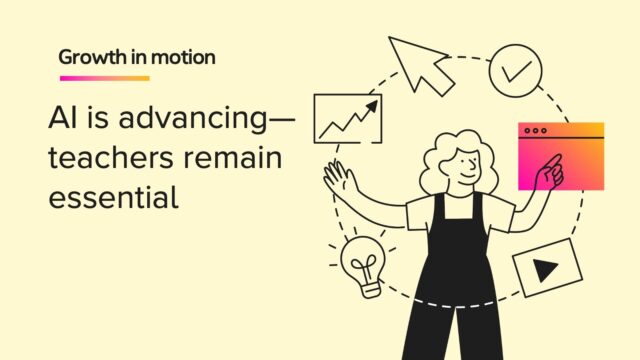
Note: This is part of a 7-video series with Dr. Kecia Ray in conversation with industry experts on using artificial intelligence in the classroom.
In this discussion, Dr. Kecia Ray and Angela Maiers explore the evolving role of artificial intelligence (AI) in education. Angela Maiers is a renowned educator, author, and founder of the "Choose to Matter" movement, which emphasizes the importance of recognizing every individual's significance. Dr. Kecia Ray, is an expert in educational technology and brings her extensive experience and passion for innovative educational practices to this timely conversation on AI.
The integration of AI in everyday life
There’s undoubtedly been a rapid integration of AI into various aspects of our lives, including education. Maiers notes that while AI might seem like a recent phenomenon, it has been around for decades, gradually becoming more visible and impactful. The key difference now is the speed at which AI is evolving and its increasing influence on our daily activities.
In her conversation Maiers highlights four main trends in AI that are particularly relevant to education:
- Personalization in AI: AI is enabling unprecedented levels of customization in various fields, from online shopping to home design. In education, this means that learning experiences can be tailored to individual students' needs and preferences, enhancing engagement and effectiveness.
- Ubiquitous Integration of AI: AI is becoming ubiquitous, seamlessly embedded in many of the tools and platforms we use daily. This integration makes AI a natural part of the learning process, helping to streamline tasks and improve efficiency.
- Generalization of AI Tools: AI tools are evolving from single-purpose applications to more comprehensive solutions.
- Democratization of AI Resources: AI is making advanced tools and resources accessible to a broader audience. This democratization empowers individuals to achieve more, regardless of their background or resources, by augmenting their capabilities.
How AI unlocks human capacity
The implementation of AI in education requires careful consideration and strategic planning. Maiers emphasizes the importance of starting slow and focusing on familiar tools and processes. However, she encourages educators to identify areas where AI can alleviate burdens and enhance creativity, rather than trying to adopt every new tool that comes along. She believes there is great potential for AI to allow educators more time to engage students in work that is best done through human interaction.
One practical approach is to use AI for tasks that are time-consuming or repetitive, such as grading or lesson planning. By automating these tasks, teachers can free up time to focus on more meaningful interactions with students. She also highlights the potential of AI to support personalized learning, allowing educators to tailor instruction to meet the unique needs of each student. She stresses that AI is a useful tool to amplify the human teacher and that it's only as good as the human behind the technology.
Digital citizenship is another critical aspect of AI integration. Educators must teach students how to use AI responsibly and ethically, understanding the implications of their actions in the digital world. This includes recognizing the importance of privacy, avoiding plagiarism, and developing critical thinking skills to evaluate AI-generated content.
Navigating the challenges and embracing the opportunities of AI
While AI offers many opportunities, it also presents significant challenges. One of the primary concerns is the potential misuse of AI, such as using it to cheat or bypass the learning process. Maiers stresses the importance of guiding students to use AI as a tool for enhancement rather than a shortcut.
Another challenge is the rapid pace of technological change. Educators must stay informed about the latest developments in AI to ensure they are using the most effective and appropriate tools. This requires ongoing professional development and a willingness to adapt to new technologies.
Despite these challenges, the opportunities presented by AI are immense. AI can transform education by providing personalized learning experiences, automating administrative tasks, and offering new ways to engage students. By embracing AI, educators can enhance their teaching practices and better prepare students for the future.
Envisioning the future of AI in education
Looking ahead, Maiers envisions a future where AI plays a central role in education. She believes that AI can help close the equity gap by providing personalized support to students who need it most. However, she also emphasizes the need for a balanced approach that considers the ethical implications of AI and ensures that human intelligence remains at the core of education.
Both Maiers and Dr. Kecia Ray are advocates for the responsible use of AI in education. They emphasize the importance of human oversight and ethical considerations in the development and implementation of AI tools. By participating in conversations about the future of AI, they are helping to shape a vision of education that leverages the strengths of both human and artificial intelligence. Watch the full interview video below.
Discover best practices for integrating AI in the classroom.
***
Prepare students for lifelong literacy with Writable, a program designed to help students in Grades 3–12 become proficient writers through AI-powered writing feedback and daily practice.












